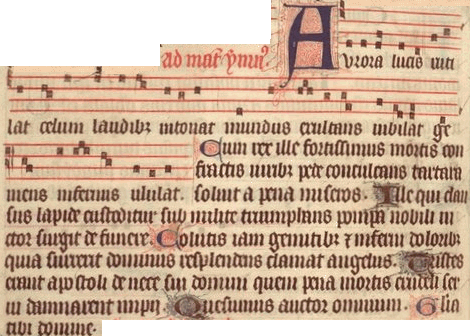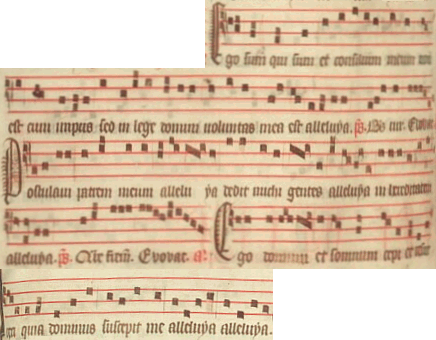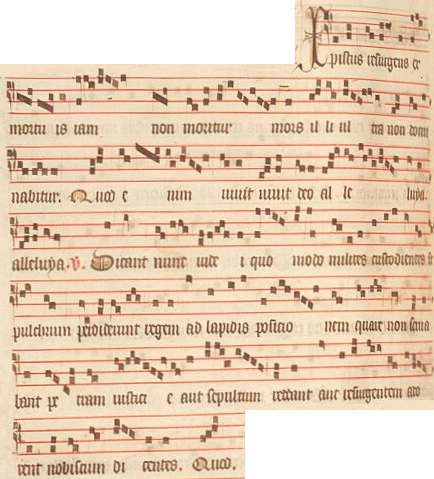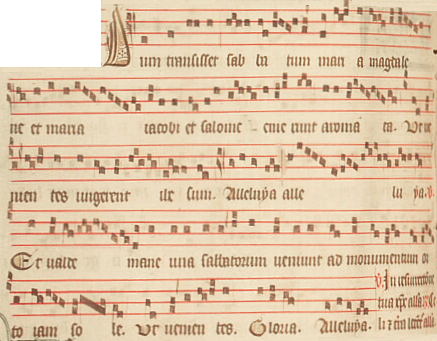READINGS: EASTER SUNDAY IV

Invitatory Psalm & BACK





Psalm 24: Hebrew English Then BACK
Psalm 66: Hebrew English Then BACK
וַיַּעֲלֹז לִבִּי - הַלְלוּ יָהּ — וּמִשִּׁירִי אֲהוֹדֶנּוּ - הַלְלוּ יָהּ
Even Years: Acts 12:1-23 1 κατ' ἐκεῖνον δὲ τὸν καιρὸν ἐπέβαλεν ἡρῴδης ὁ βασιλεὺς τὰς χεῖρας κακῶσαί τινας τῶν ἀπὸ τῆς ἐκκλησίας. 2 ἀνεῖλεν δὲ ἰάκωβον τὸν ἀδελφὸν Ἰωάννου μαχαίρῃ. 3 ἰδὼν δὲ ὅτι ἀρεστόν ἐστιν τοῖς ἰουδαίοις προσέθετο συλλαβεῖν καὶ Πέτρον ἦσαν δὲ [αἱ] ἡμέραι τῶν ἀζύμων, 4 ὃν καὶ πιάσας ἔθετο εἰς φυλακήν, παραδοὺς τέσσαρσιν τετραδίοις στρατιωτῶν φυλάσσειν αὐτόν, βουλόμενος μετὰ τὸ πάσχα ἀναγαγεῖν αὐτὸν τῷ λαῷ. 5 ὁ μὲν οὖν Πέτρος ἐτηρεῖτο ἐν τῇ φυλακῇ: προσευχὴ δὲ ἦν ἐκτενῶς γινομένη ὑπὸ τῆς ἐκκλησίας πρὸς τὸν θεὸν περὶ αὐτοῦ. 6 ὅτε δὲ ἤμελλεν προαγαγεῖν αὐτὸν ὁ ἡρῴδης, τῇ νυκτὶ ἐκείνῃ ἦν ὁ Πέτρος κοιμώμενος μεταξὺ δύο στρατιωτῶν δεδεμένος ἁλύσεσιν δυσίν, φύλακές τε πρὸ τῆς θύρας ἐτήρουν τὴν φυλακήν. 7 καὶ ἰδοὺ ἄγγελος κυρίου ἐπέστη, καὶ φῶς ἔλαμψεν ἐν τῷ οἰκήματι: πατάξας δὲ τὴν πλευρὰν τοῦ Πέτρου ἤγειρεν αὐτὸν λέγων, ἀνάστα ἐν τάχει. καὶ ἐξέπεσαν αὐτοῦ αἱ ἁλύσεις ἐκ τῶν χειρῶν. 8 εἶπεν δὲ ὁ ἄγγελος πρὸς αὐτόν, ζῶσαι καὶ ὑπόδησαι τὰ σανδάλιά σου. ἐποίησεν δὲ οὕτως. καὶ λέγει αὐτῷ, περιβαλοῦ τὸ ἱμάτιόν σου καὶ ἀκολούθει μοι. 9 καὶ ἐξελθὼν ἠκολούθει, καὶ οὐκ ᾔδει ὅτι ἀληθές ἐστιν τὸ γινόμενον διὰ τοῦ ἀγγέλου, ἐδόκει δὲ ὅραμα βλέπειν. 10 διελθόντες δὲ πρώτην φυλακὴν καὶ δευτέραν ἦλθαν ἐπὶ τὴν πύλην τὴν σιδηρᾶν τὴν φέρουσαν εἰς τὴν πόλιν, ἥτις αὐτομάτη ἠνοίγη αὐτοῖς, καὶ ἐξελθόντες προῆλθον ῥύμην μίαν, καὶ εὐθέως ἀπέστη ὁ ἄγγελος ἀπ' αὐτοῦ. 11 καὶ ὁ Πέτρος ἐν ἑαυτῷ γενόμενος εἶπεν, νῦν οἶδα ἀληθῶς ὅτι ἐξαπέστειλεν [ὁ] κύριος τὸν ἄγγελον αὐτοῦ καὶ ἐξείλατό με ἐκ χειρὸς ἡρῴδου καὶ πάσης τῆς προσδοκίας τοῦ λαοῦ τῶν ἰουδαίων. 12 συνιδών τε ἦλθεν ἐπὶ τὴν οἰκίαν τῆς μαρίας τῆς μητρὸς Ἰωάννου τοῦ ἐπικαλουμένου μάρκου, οὗ ἦσαν ἱκανοὶ συνηθροισμένοι καὶ προσευχόμενοι. 13 κρούσαντος δὲ αὐτοῦ τὴν θύραν τοῦ πυλῶνος προσῆλθεν παιδίσκη ὑπακοῦσαι ὀνόματι ῥόδη: 14 καὶ ἐπιγνοῦσα τὴν φωνὴν τοῦ Πέτρου ἀπὸ τῆς χαρᾶς οὐκ ἤνοιξεν τὸν πυλῶνα, εἰσδραμοῦσα δὲ ἀπήγγειλεν ἑστάναι τὸν Πέτρον πρὸ τοῦ πυλῶνος. 15 οἱ δὲ πρὸς αὐτὴν εἶπαν, μαίνῃ. ἡ δὲ διϊσχυρίζετο οὕτως ἔχειν. οἱ δὲ ἔλεγον, ὁ ἄγγελός ἐστιν αὐτοῦ. 16 ὁ δὲ Πέτρος ἐπέμενεν κρούων: ἀνοίξαντες δὲ εἶδαν αὐτὸν καὶ ἐξέστησαν. 17 κατασείσας δὲ αὐτοῖς τῇ χειρὶ σιγᾶν διηγήσατο [αὐτοῖς] πῶς ὁ κύριος αὐτὸν ἐξήγαγεν ἐκ τῆς φυλακῆς, εἶπέν τε, ἀπαγγείλατε Ἰακώβῳ καὶ τοῖς ἀδελφοῖς ταῦτα. καὶ ἐξελθὼν ἐπορεύθη εἰς ἕτερον τόπον. 18 γενομένης δὲ ἡμέρας ἦν τάραχος οὐκ ὀλίγος ἐν τοῖς στρατιώταις, τί ἄρα ὁ Πέτρος ἐγένετο. 19 ἡρῴδης δὲ ἐπιζητήσας αὐτὸν καὶ μὴ εὑρὼν ἀνακρίνας τοὺς φύλακας ἐκέλευσεν ἀπαχθῆναι, καὶ κατελθὼν ἀπὸ τῆς ἰουδαίας εἰς καισάρειαν διέτριβεν. 20 ἦν δὲ θυμομαχῶν τυρίοις καὶ σιδωνίοις: ὁμοθυμαδὸν δὲ παρῆσαν πρὸς αὐτόν, καὶ πείσαντες βλάστον τὸν ἐπὶ τοῦ κοιτῶνος τοῦ βασιλέως ᾐτοῦντο εἰρήνην, διὰ τὸ τρέφεσθαι αὐτῶν τὴν χώραν ἀπὸ τῆς βασιλικῆς. 21 τακτῇ δὲ ἡμέρᾳ ὁ ἡρῴδης ἐνδυσάμενος ἐσθῆτα βασιλικὴν [καὶ] καθίσας ἐπὶ τοῦ βήματος ἐδημηγόρει πρὸς αὐτούς: 22 ὁ δὲ δῆμος ἐπεφώνει, θεοῦ φωνὴ καὶ οὐκ ἀνθρώπου. 23 παραχρῆμα δὲ ἐπάταξεν αὐτὸν ἄγγελος κυρίου ἀνθ' ὧν οὐκ ἔδωκεν τὴν δόξαν τῷ θεῷ, καὶ γενόμενος σκωληκόβρωτος ἐξέψυξεν. Odd Years: Revelation 12:1-17 καὶ
σημεῖον μέγα
ὤφθη ἐν τῷ
οὐρανῷ,
|
Even Years: Augustine of Hippo, Sermon 352, 2 (PL 39,1550-1551) Triplex autem consideratio agendae poenitentiae in sacra scriptura inuenitur. nam neque ad baptismum christi, in quo omnia peccata delentur, quisquam bene accedit, nisi agendo poenitentiam de uita pristina. nemo enim eligit uitam nouam, nisi quem ueteris poenitet. hoc autem etiam auctoritate diuinorum librorum probare debemus, utrum baptizandi egerint poenitentiam. Quando spiritus sanctus missus est ante promissus, et impleuit dominus fidem pollicitationis suae; accepto spiritu sancto discipuli, ut nostis, coeperunt loqui omnibus linguis, ut in illis qui aderant, linguam suam quisque cognosceret. hoc autem miraculo territi, consilium uitae ab apostolis petierunt. Tunc eis petrus annuntiauit eum colendum quem crucifixerunt, ut eius iam sanguinem biberent credentes, quem fuderant saeuientes. annuntiato autem illis domino nostro iesu christo, et agnoscentibus reatum suum, ut impleretur in eis quod propheta ante praedixerat, conuersus sum in aerumnam meam, dum configitur spina; compuncti sunt. conuersi enim sunt in aerumnam doloris, cum configeretur spina peccati recordationis. nihil enim mali se fecisse putauerant, nondum infixa erat spina. loquente autem petro, ut agnoscas infixam spinam, scriptura dixit, petro loquente compuncti sunt corde... Cum ergo spina illa recordationis compuncti dicerent apostolis, quid ergo faciemus? ait illis petrus, agite poenitentiam, et baptizetur unusquisque uestrum in nomine domini nostri iesu christi; et remittentur uobis peccata... illa prima competentium est et ad baptismum uenire sitientium... Est alia quippe quotidiana. et ubi illam ostendimus poenitentiam quotidianam? non habeo ubi melius ostendam, quam in oratione quotidiana, ubi dominus orare nos docuit, quid ad patrem dicamus ostendit, et in his uerbis posuit: dimitte nobis debita nostra, sicut et nos dimittimus debitoribus nostris... Est poenitentia grauior atque luctuosior, in qua proprie uocantur in ecclesia poenitentes, remoti etiam a sacramento altaris participandi, ne accipiendo indigne, iudicium sibi manducent et bibant. illa ergo poenitentia luctuosa est. graue uulnus est: adulterium forte commissum est, forte homicidium, forte aliquod sacrilegium; grauis res, graue uulnus, lethale, mortiferum: sed omnipotens medicus. Odd Years: Vatican II, Lumen gentium, 1-3
|
GOSPELS FOR THE THREE CYCLES
*A* , *B* , *C*
| Prayer |

